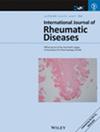Causal Association Between Chronic Inflammatory Arthropathies and Sarcopenia and the Mediation Role of Inflammatory Factors
Abstract
Background
Although chronic inflammatory arthropathies (CIA) are associated with sarcopenia, sarcopenia plays a role in their pathogenesis remains unknown. This study investigated the causal relationship between sarcopenia and CIA and to identify potential mediating factors.
Methods
We examined data from 458 910 participants in the UK Biobank to analyze the association between sarcopenia-related traits and CIA. Associations between hand-grip strength, muscle mass, walking pace, and CIA were analyzed using Cox regression models. Then, we performed a mediation analysis to explore the underlying mechanisms.
Results
Individuals with low hand-grip strength exhibited a 1.88-fold (95% CI 1.73–2.05), 2.22-fold (95% CI 2.02–2.45), and 1.36-fold (95% CI 1.32–1.41) increased risk of rheumatoid arthritis (RA), spondyloarthritis (SpA), and osteoarthritis (OA), respectively. The HRs for sarcopenia were 1.64 (95% CI 1.15–2.32) for RA, 1.83 (95% CI 1.21–2.77) for SpA, and 1.26 (95% CI 1.09–1.45) for OA. Additionally, individuals with a slow walking pace exhibited a 1.83-fold (95% CI 1.66–2.02), 3.58-fold (95% CI 3.25–3.95), and 1.82-fold (95% CI 1.77–1.88) increased risk of RA, SpA, and OA, respectively. Furthermore, we identified inflammatory markers as possible mediators of the causal effects of low hand-grip strength on the development of CIA.
Conclusions
Our findings suggest that sarcopenia is independently associated with an increased risk of CIA, which is partially mediated by inflammation factors.

 求助内容:
求助内容: 应助结果提醒方式:
应助结果提醒方式:


